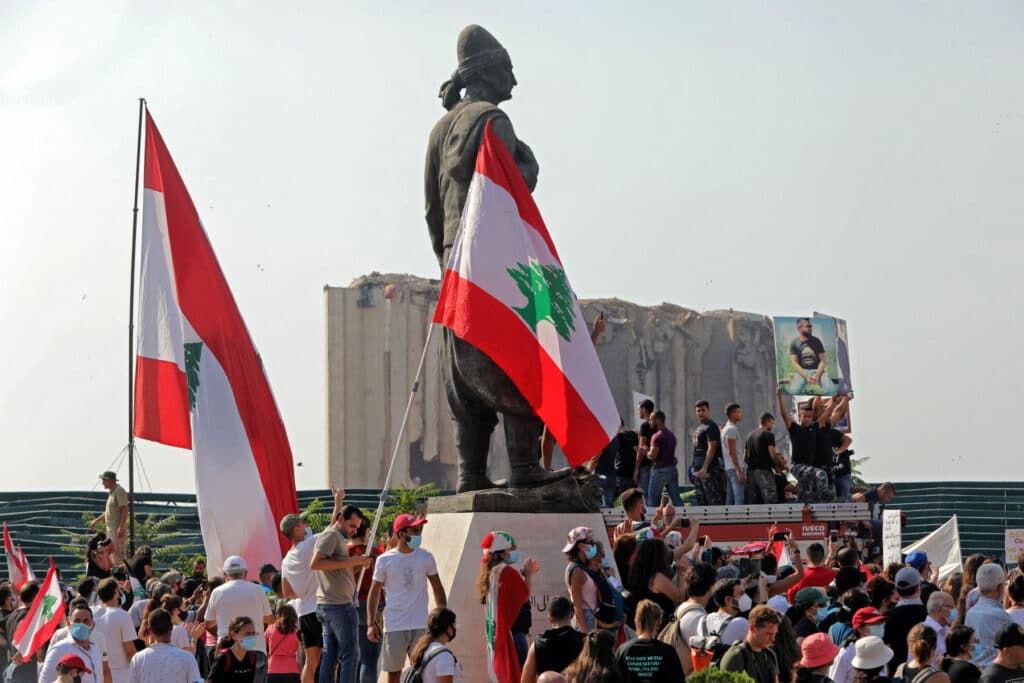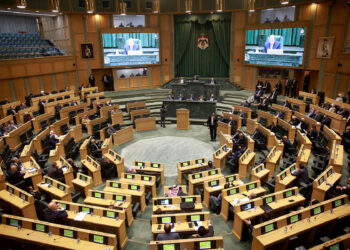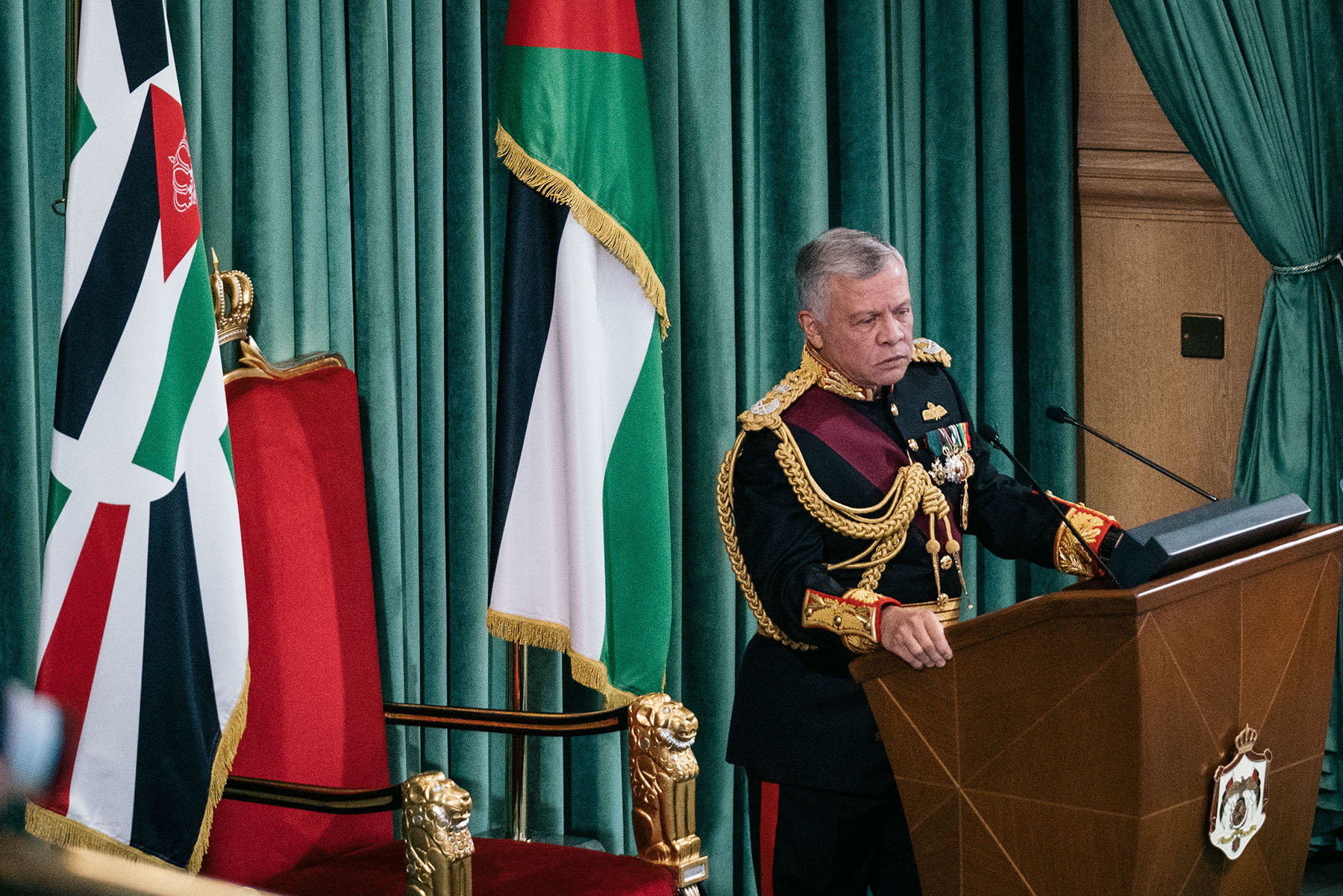Dario Sabaghi is a freelance journalist whose work has appeared in The Independent, Middle East Eye, Deutsche Welle and other outlets.
BEIRUT — On the fourth day of every month, at 6:07 p.m., dozens of people gather in front of a 12-foot tall bronze statue facing Lebanon's main port. The statue, depicting a Lebanese emigrant, somehow survived the catastrophic explosion at the port on Aug. 4, 2020, which sent shockwaves across the city and destroyed buildings many miles away. These Beirutis likely didn't know each other before that August evening more than two years ago when, just after 6 p.m., a huge stockpile of ammonium nitrate ignited a blast that devastated a large part of the Lebanese capital, displacing hundreds of thousands of residents, killing more than 220 people and injuring more than 6,500 others.
Since then, they have been united in grief for their lovedones lost in the disaster, and their determination for justice. When they gather at the foot of the statue, they face the port's damaged grain silos—the only structure left standing near the blast's epicenter—that have become the physical symbol of one of the most powerful non-nuclear explosions ever recorded, which so abruptly changed Beirut's waterfront and skyline. The ammonium nitrate, an industrial chemical commonly used in fertilizers and as an explosive for quarrying and mining, had been dangerously stored at the port since 2014 following the seizure of a cargo ship bound for Mozambique.
In their monthly gatherings, and their daily activism across Beirut, the families of the victims call for Lebanon's corrupt, insular political class to be held accountable for the negligence that was directly responsible for the explosion. Yet no one has been held accountable. For so many Lebanese, everything about the explosion, including its crushing aftermath and the continued lack of any accountability, embodies all the dysfunction and venality of the Lebanese state.
Cecile Roukoz, 48, who lost her brother in the explosion, says that Lebanese politicians "are doing everything to obstruct investigations. The only thing we can do is protest." Her brother was working at the port at the time of the blast. "All of them knew about the presence of ammonium nitrate at the port," she says of Lebanon's leaders. "They killed 80 people inside the port. We pray for our victims because we haven't yet found justice."
The investigation into the port explosion has been derailed by the entrenched power blocs and sectarian parties in Lebanon's factionalized political system, which seem more interested in protecting themselves than exposing the truth.
- Dario Sabaghi
In the years leading up to the blast, Lebanese officials were well aware of the dangers of storing the ammonium nitrate at the port, as an extensive paper trail made clear. Customs officials sent multiple letters to Lebanese courts requesting that the confiscated cargo be removed, but they were rebuffed. Despite increasingly dire warnings between some officials in the Lebanese government right up until the weeks before the explosion, including to a string of prime ministers, the ammonium nitrate just stayed in its dockside warehouse. The available evidence "indicates that multiple Lebanese authorities were, at a minimum, criminally negligent under Lebanese law in their handling of the cargo, creating an unreasonable risk to life," according to Human Rights Watch.
Yet the investigation into the port explosion has been derailed by the entrenched power blocs and sectarian parties in Lebanon's factionalized political system, which seem more interested in protecting themselves than exposing the truth. After he stepped down in the days following the blast, along with several lawmakers and other officials, Prime Minister Hassan Diab stayed on in a caretaker capacity, at President Michel Aoun's request. Diab's caretaker government formed an investigative committee, led by Diab himself, which arrested 25 people suspected of involvement in the explosion, including several port officers and state officials.
Lebanon's Supreme Judicial Council then appointed a judge, Fadi Sawan, to lead an investigation to determine the accountability of state officials. After interviewing witnesses and collecting documents for several months, Sawan, in late 2020, charged Diab and three former ministers—a former finance minister, Ali Hassan Khalil, and two former ministers of transportation and public works, Youssef Fenianos and Ghazi Zaiter—with criminal negligence over the explosion. All of them then refused to cooperate with Sawan's investigation and tried to discredit him.

Khalil and Zeitar, linked to the Shia party Amal, filed a formal complaint for the judge to be removed from the case. Other Lebanese factions, including Amal's ally, Hezbollah, and former Sunni Prime Minister Saad Hariri—though rivals in Lebanon's power-sharing political system—also waged a campaign against Sawan, accusing him of impartiality and overstepping his powers.
Lebanon's Court of Cassation followed through by removing Sawan from the investigation in February 2021. The court partly based its decision, bizarrely, on the fact that Judge Sawan's own home had been damaged in the port explosion, which it claimed raised legitimate questions about his impartiality. If that made Sawan impartial, so are the more than 300,000 residents of Beirut who were displaced by the blast, which damaged 77,000 housing units in the city, according to a joint assessment by the U.N. and the Municipality of Beirut.
The court's decision angered families of the victims and members of Lebanese civil society, who called it a mockery of justice. It spotlighted the lack of cooperation in, and even outright hostility to, any investigation from Lebanon's entire political class.
Sawan's successor, Tarek Bitar, faced the same hurdles when he took over the investigation after Sawan's removal. Since early 2021, Bitar has been suspended from the investigation four times because of lawsuits filed by various politicians who he summoned for interrogation. Hezbollah and Amal both requested that he be removed from the investigation. Members of parliament stalled a vote on Bitar's request to lift immunity from prosecution for politicians and high-level security officials suspected in the case—essentially stonewalling the judge from investigating the senior-most figures in Lebanon.
"I have been protesting along with the families of the victims since the beginning. I wasn't injured, but they destroyed Beirut," says Lina Boubess, a 62-year-old activist. "They destroyed us because we are Beirut."
Amid this political interference in the investigation, the families of the victims continue taking to the streets every month to pay tribute to their loved ones and protest outside ministries demanding justice. As he has grappled with legal and political hurdles, Bitar has gained the support of many of the victims' families and much of Lebanese civil society as an honest and transparent judge.
In October 2021, protests to remove Bitar escalated in a deadly street battle between Hezbollah and Amal protesters and snipers suspected to be from the Lebanese Forces, a right-wing Christian party. Seven people were killed and more than 30 wounded in clashes in a neighborhood that had been a frontline between Shia and Christian areas during Lebanon's long civil war.
The clashes militarized the already politicized debate over responsibility for the port blast and how—or even whether—it could be investigated. The violence also split the families of the victims into two groups—those supporting Bitar and those calling for his removal. Because of all the political maneuvers against him, Bitar's investigation has been indefinitely suspended since late 2021.
The fierce debate over the investigation reignited this past summer when some of the damaged silos at the port collapsed, after fires there were left burning for weeks. The silos had held most of Lebanon's grain reserves, and fermenting grain left at the site apparently ignited in the summer heat. Families of the victims and civil society groups accused the government of further negligence and of deliberately trying to destroy any physical memory of the disaster. Activists and other advocates in Beirut have been pushing to preserve the silos as a memorial to fight back against collective amnesia in Lebanon, where not even the civil war is formally commemorated (many of the same warlords and militias from the civil war just reinvented themselves as politicians and political parties when the war ended in the 1990s).
But the investigation keeps getting held up by Lebanon's crooked politics. Zeitar and Khalil, two of the former ministers implicated in the investigation, filed a lawsuit last month against another judge, Jean-Marc Oueiss, who was appointed to rule on the dismissal requests filed against Bitar, vaguely alleging "serious faults." In another, more ludicrous twist, the Court of Cassation, which would deliberate on this lawsuit, needs more members to form a quorum, but the Ministry of Finance has refused to authorize the funds to hire new members.
"What is happening is unlawful. It is not acceptable. It is not something they can do," says Mariana Fodoulian, one of the spokespersons for the families of the victims, of the interference of Lebanese politicians.
International calls for a fair and credible judicial process in Lebanon to hold those accountable for the port explosion have clearly gone nowhere. But international cooperation is also lacking, as attention fades years after the blast. While United Nations experts and dozens of international and local NGOs have called for an international investigation, it's hard to see how Lebanon's political elite would ever agree to that.
To Lina Boubess, a 62-year-old activist, the lack of justice and the brazen political interference in the investigation show what the sectarian parties and blocs running Lebanon think of ordinary Lebanese. "I have been protesting along with the families of the victims since the beginning. I wasn't injured, but they destroyed Beirut," she says of the political elite. "They destroyed us because we are Beirut."































![Security forces loyal to the interim Syrian government stand guard at a checkpoint previously held by supporters of deposed president Bashar al-Assad, in the town of Hmeimim, in the coastal province of Latakia, on March 11, 2025. Syria's new authorities announced on March 10, the end of an operation against loyalists of deposed president Bashar al-Assad, after a war monitor reported more than 1,000 civilians killed in the worst violence since his overthrow. The Syrian Observatory for Human Rights said the overwhelming majority of the 1,068 civilians killed since March 6, were members of the Alawite minority who were executed by the security forces or allied groups. (Photo by OMAR HAJ KADOUR / AFP) / “The erroneous mention[s] appearing in the metadata of this photo by OMAR HAJ KADOUR has been modified in AFP systems in the following manner: [Hmeimim] instead of [Ayn Shiqaq]. Please immediately remove the erroneous mention[s] from all your online services and delete it (them) from your servers. If you have been authorized by AFP to distribute it (them) to third parties, please ensure that the same actions are carried out by them. Failure to promptly comply with these instructions will entail liability on your part for any continued or post notification usage. Therefore we thank you very much for all your attention and prompt action. We are sorry for the inconvenience this notification may cause and remain at your disposal for any further information you may require.”](https://dawnmena.org/wp-content/uploads/2025/04/syria-22039885951-360x180.jpg)






